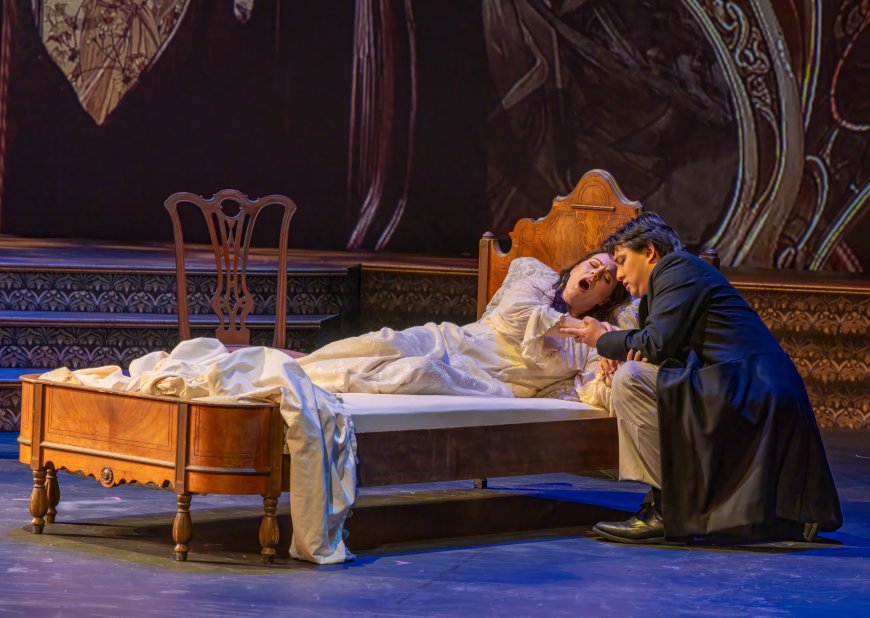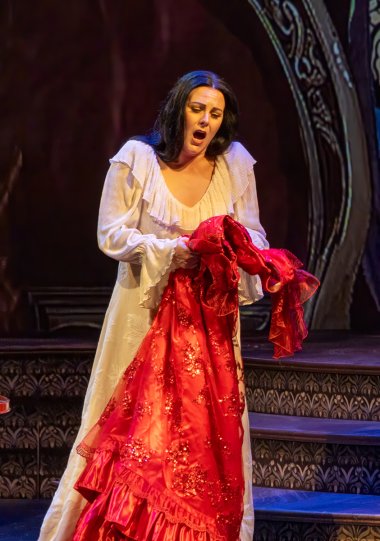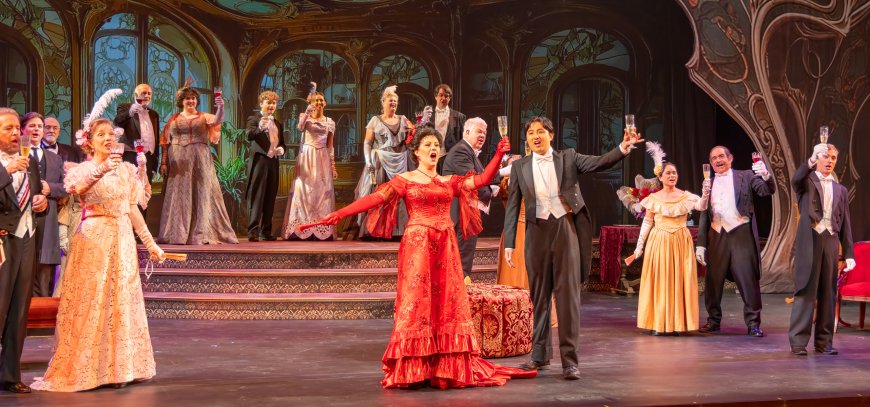
Giuseppe Verdi’s La traviata, one of the great works of his middle period, rests on a three-legged stool of characters: Violetta Valéry, the warmhearted titular courtesan; her young lover Alfredo Germont; and Giorgio Germont, Alfredo’s protective father. That stool is not well balanced in Livermore Valley Opera’s production, seen on Sunday, Sept. 28, at the Bankhead Theater.
The plot rests on the conflict between Violetta and Alfredo’s passionate love and Giorgio’s desire to protect his daughter’s engagement, which is endangered by Alfredo’s public involvement with a courtesan. Violetta, hearing about Giorgio’s daughter, makes the decision to sacrifice her relationship with Alfredo and resumes her relationship with Baron Douphol, a former patron. Though there is a happy reunion between the lovers at the end, Violetta is on her deathbed from tuberculosis, and the curtain comes down at her demise.

Avery Boettcher sings a splendid Violetta in Livermore Valley Opera’s production. The soprano portrays the character’s allure and complexity persuasively, and her big, dark voice is flexible enough for the role’s Act 1 vocal fireworks. If anything, her voice might be a bit too big for the tiny venue.
But it’s her superb vocal and physical acting in Acts 2 and 3 that will stay with me the longest: Violetta’s plea to Giorgio’s daughter to remember her sacrifice after her death; the aching appeal of “Amami, Alfredo” (Love me, Alfredo) when she’s about to leave him; her desperation during their confrontation at a party. As she reads Giorgio’s letter, her voice pales and stays that way for much of the act, signaling Violetta’s increasing weakness and the approach of her death. All in all, a masterful performance of a great dramatic role.
Would that her Alfredo and Giorgio had been on the same level. Brad Bickhardt’s sweet light tenor worked best in “Parigi, o cara” (Paris, my dear), the Act 3 duet, where he blended beautifully with Boettcher. Elsewhere, he was unconvincing, bringing little vocal or dramatic heat to a role that depends on the audience’s belief that Alfredo is passionately in love with Violetta. “De’ miei bollenti spiriti” (My passionate spirit) was lukewarm, a description that applies to his entire performance.
Krassen Karagiozov’s Giorgio came closer to meeting the role’s requirements: He was dramatically convincing, if rather overbearing, largely due to his consistent, nearly unmodulated loudness. He has a fine, firm baritone, perfect for Verdi’s dramatic baritone roles. More vocal nuance would have been most welcome, though you could certainly understand Violetta’s yielding to his demands.
All the smaller roles were well sung and acted: Gilead Wurman’s dignified Baron Douphol, Kirk Eichelberger’s kind Dottore Grenvil, and Leandra Ramm’s affectionately supportive Annina stood out.

Alexander Katsman, the company’s music director, conducted stylishly; his tempos were in the sweet spot of rightness, never extreme. The small chorus, under the direction of Bruce Olstad, sounded excellent throughout.
Candace Evans’s stage direction was clear and straightforward, with plenty of telling detail, such as a courtesan quietly refusing a party guest’s attentions. The two party scenes worked particularly well, including lots of activity in the small chorus that nonetheless never distracted the audience from the main characters. Her work with the principals was good, particularly with Boettcher.
The company opted to set La traviata in 1910, and Jean-François Revon provided a beautiful Art Nouveau unit set whose locations were signaled by changing the props and rear set element.
The two remaining performances are scheduled for Oct. 4 and 5. For tickets and more information, visit livermorearts.org.




